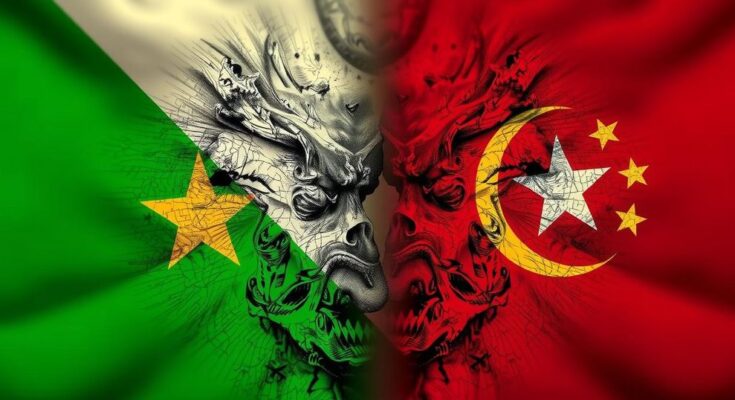The recent meeting between Lt Gen Abdelfattah El Burhan of Sudan and Eritrean President Isaias Afwerki highlights growing military cooperation amid escalating tensions in Sudan. Agreements were made regarding security and economic collaboration, with a focus on managing armed groups and preventing conflict spillover. Observers warn that the alignment of eastern Sudanese militias with the SAF may lead to broader tribal violence, posing a significant stability threat in the region.
Lt Gen Abdelfattah El Burhan, the leader of Sudan’s Sovereignty Council and Commander-in-chief of the Sudanese Armed Forces (SAF), recently concluded a one-day visit to Eritrea’s capital, Asmara, amid ongoing turmoil in Sudan. Accompanied by his newly formed cabinet, El Burhan met with Eritrean President Isaias Afwerki to discuss military cooperation, security coordination, and economic partnerships. They reached agreements underscoring Eritrea’s role in supporting Sudan, with President Afwerki advocating for a resolution to Sudan’s crisis through its own people, backed by regional assistance.
In their discussions, Afghanistan reiterated Sudan’s sovereignty and stability as paramount for the region. El Burhan expressed gratitude for Eritrea’s historical support during Sudan’s conflicts and underscored the need to fortify bilateral relations. Analysts perceive this visit as a strategic effort to secure Eritrea as an ally of Sudan’s military while highlighting the complexities of armed groups operating in Eritrea’s western region.
Eritrea can be seen as a crucial host for various Eastern Sudanese armed movements. Groups such as the Beja Congress and the United Popular Front for Liberation and Justice have formed alliances with Sudan’s military, deploying personnel in eastern Sudan while others focus on local defense. Eritrea itself is working on establishing a security belt along its borders to mitigate potential conflict spillover.
Economic discussions were imperative during the meeting, including the potential reopening of border crossings, particularly the Kassala-El Lafa highway, which is nearing 80% completion in revitalization efforts to enhance trade. Eritrea’s military readiness relates to ensuring regional stability, with indications of potential intervention should Sudan’s conflict spill into eastern states such as Kassala, El Gedaref, or the Red Sea.
Recent developments in eastern Sudan have led to increased tensions with several armed groups, including the Eastern Battalion and the Beja Congress, coordinating efforts with the SAF. These changes, largely attributed to Eritrean training camps, heighten fears of clashes between armed factions and may lead to tribal violence. Notably, Amin Daoud’s Eastern Battalion, previously neutral, now appears aligned with the SAF, which raises alarm about the integration of local militias into broader military operations against the paramilitary Rapid Support Forces (RSF).
Observers caution that the dynamics around SAF-RSF conflicts may evolve into a sweeping tribal war involving historically allied tribes from neighboring regions and across Eritrea’s borders. With Eritrean training camps now supporting groups like the Eastern Sudan Liberation Forces and the Beja Congress, the region’s militarization poses grave risks to stability. Analysts underscore that the potential escalation of tribal polarization, compounded by eastern Sudan’s strategic significance due to its vital Red Sea ports and resource-rich lands, could threaten security in the region. Thus, Sudan’s deepening alliance with Eritrea is a pivotal factor in the ongoing militarization and fragmentation in eastern Sudan.
The geopolitical landscape of eastern Sudan has been marked by complex tribal dynamics and armed conflicts. Various armed groups operate in the region, often gaining backing from regional allies like Eritrea. The recent military collaboration between Sudan and Eritrea, particularly in the context of Sudan’s internal strife, highlights underlying tensions that could exacerbate existing tribal conflicts. This alliance is seen by many as a strategic maneuver as Eritrea seeks to influence developments in Sudan while endorsing a narrative of local sovereignty and stability.
In conclusion, Sudan’s alliance with Eritrea carries significant implications for the stability of eastern Sudan. The military cooperation and economic discussions arise against a backdrop of escalating tensions and the prevalent threat of tribal conflict. As armed groups increasingly align with the Sudanese military, the risk of a wider conflagration involving tribal factions becomes more pronounced. Hence, the intricate dynamics of this relationship warrant close observation to avert deeper instability in the region.
Original Source: www.dabangasudan.org




